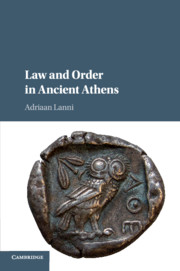Book contents
- Frontmatter
- Dedication
- Contents
- Acknowledgments
- List of Abbreviations
- Introduction: The Puzzle of Athenian Order
- PART ONE
- PART TWO
- THREE The Expressive Eff ect of Statutes
- FOUR Enforcing Norms in Court
- FIVE Court Argument and the Shaping of Norms
- SIX Transitional Justice in Athens: Law, Courts, and Norms
- Conclusion
- Bibliography
- Index
THREE - The Expressive Eff ect of Statutes
from PART TWO
Published online by Cambridge University Press: 05 August 2016
- Frontmatter
- Dedication
- Contents
- Acknowledgments
- List of Abbreviations
- Introduction: The Puzzle of Athenian Order
- PART ONE
- PART TWO
- THREE The Expressive Eff ect of Statutes
- FOUR Enforcing Norms in Court
- FIVE Court Argument and the Shaping of Norms
- SIX Transitional Justice in Athens: Law, Courts, and Norms
- Conclusion
- Bibliography
- Index
Summary
Given that the Athenian courts did not predictably enforce statutes, a traditional Austinian view of law would suggest that Athenian laws played little role in maintaining order. But a law's impact is not limited to the direct effect produced by the sanction or incentive created by a law; law can serve a variety of other roles – symbolic, constitutive, for example – that have profound effects on society. Some scholars working on modern law have tried to describe some of the mechanisms through which a law may strengthen, weaken, or change social norms and thereby indirectly affect individuals’ behavior. To cite a simple example, an antilittering ordinance may have a significant impact even if it is rarely (or never) officially enforced. The law may serve an “expressive function,” communicating that the community disapproves of those who litter, and emboldening individuals to enforce the law informally, thereby changing both the norms and behavior surrounding the disposal of waste. Other modern examples of statutes that have significant symbolic content and may have important independent expressive effects include antidiscrimination laws, drunk driving laws, and hate crime legislation.
In this chapter I argue that Athenian statutes played an important role in fostering compliance with law even though they were not predictably enforced through the courts. I try to show that Athenian statutes had important effects on Athenian social life quite apart from any direct effects of the sanction provided in the law. Drawing on recent research by legal scholars and sociologists on the mechanisms of social influence, I first discuss the theory of the expressive function of law and the benefits of applying these insights to ancient Athens. I also try to identify some features of Athenian life (such as the greater popular participation in government and the judicial process) that may have made the expressive power of laws greater in Athens than it is today in the United States. I then provide case studies of two sets of Athenian statutes whose impact extended well beyond the relatively few cases in which they were enforced through the court system.
In the first case study, I examine the expressive effects of the statute prohibiting hubris (“outrage” or intentionally treating someone with dishonor). This statute was unusual, perhaps unique, in that it protected slaves as well as freepersons. But because slaves did not have standing to bring suits, this law was rarely enforced in court.
- Type
- Chapter
- Information
- Law and Order in Ancient Athens , pp. 77 - 118Publisher: Cambridge University PressPrint publication year: 2016

